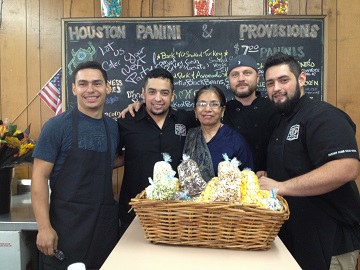
It worked for Alex Colby, currently the proud proprietor, along with his brother and other partners, of Houston Panini & Provisions in Garden Oaks. Now Tina Marie Merritt and Mae Moore are hoping for the same magic.
But Saleha Khumawala, Robert Grinaker Professor of Accounting at the University of Houston, says running a small business isn’t about luck or magic. She and graduate students from the C.T. Bauer College of Business teach financial literacy and the basics of entrepreneurship during a semester-long program serving pockets of the inner city.
Graduates of the Saturday morning classes are encouraged to pitch their business ideas to microfinance companies and other investors, competing for startup capital.
Many people view the loans, generally about $5,000, as the prize. But Khumawala said the true prize is the knowledge that comes from learning how to run a business.
“Money is paper at the end of the day,” she said. “This is a loan. You have to pay it back. Education is the key to empowerment.”
Khumawala founded SURE™, or Stimulating Urban Renewal through Entrepreneurship, to teach the fundamentals of business and entrepreneurship to community members with an idea for a business and a desire to succeed but no formal business training.
She said the need in Houston is huge, and a local-only emphasis allows UH students to not only work with local nonprofits and microfinance organizations but to broaden students’ experiences.
The program is so popular it is filled through fall 2015. Graduate business students help the aspiring entrepreneurs write business and marketing plans, but they also learn about real-world business challenges, Khumawala said, developing both empathy and leadership skills.
Finding volunteers is easy. Tamara Pinkerton, studying for her master’s degree in accounting, heard about the program at a grad student mixer; it matched many of her interests: volunteerism, finance, entrepreneurship. She is working with several future entrepreneurs in this semester’s Saturday class at Ripley House in the East End, while other graduate students do everything from teaching to translating for Spanish-speaking entrepreneurs.
Most of the would-be entrepreneurs – there are between 40 and 50 every semester – arrive with an idea for a business, ranging from lawn services to nonprofit organizations. Merritt and Moore signed up on the recommendation of Donald Moore – Merritt’s father and Moore’s husband – who completed an earlier program before starting an advertising and marketing agency.
They plan to start a payroll outsourcing and employment agency.
“We wanted insight and ideas to jumpstart our own business,” Merrit said.
Colby entered the program last fall with an idea – selling his grandfather’s lemon-flavored popcorn – but no business background. Back in his hometown of Houston after working on oil rigs in the Permian Basin, he had decided to try his hand as an entrepreneur when he saw a flier for the class at Neighborhood Centers, a social service program that has worked with Khumawala and UH to promote the microfinance program.
He completed the program and made his pitch to investors in late 2013, coming away with a loan from Kiva Zip, endorsed by Bayou Microfund, a Kiva Zip trustee to provide crowd-funded, zero percent interest loans of up to $5,000.
Colby and his partners all grew up in the neighborhood, and he said they used the loan to start Houston Panini & Provisions eight months ago.
“I knew nothing about business” before starting the program, he said. “The knowledge I gained, the people I met, I can’t put a price on it. It gave me the confidence to accept a big loan. It gave me the confidence to take a risk.”